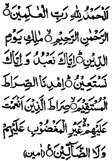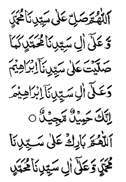(From The Elementary
Teachings of Islam by His Exalted Eminence Maulana Mohammed Ahdul Aleem
Siddiqui)
6.Performance
of Prayer
Click these links for illustrative photos of postures
for both males and females
1.
Q. Can you give a complete
description of the performance of prayer?
A. Yes. A Prayer
consists of either two, three or four Rak'ats, and a Rak'at
is performed thus:
(1) I stand erect, facing
the direction of Ka'ba in Mecca, and after having the niyyat, (the
intention) in my mind of what prayer I am about to offer and preferably
uttering it to myself;
(2) I raise both of my hands
up to the ears and, saying "Allahu Akbar," and then bring them down
and place the right hand upon the left below the navel.
(3) I
then recite:
(a) Subhanak-Allahumma
wa bihamdika wa tabarakasmuka wa ta'ala jadduka wa la ilaha ghairuka.

'All Glory be to
Thee, O Allah! and Praise be to Thee; blessed is Thy Name and exalted Thy
Majesty; and there is none worthy of worship besides Thee.'
(b) A'oozu billahi minash-shaitanir-rajeem

'I betake myself to Allah
for refuge from the accursed Satan.'
(c) Bismillah-ir-Rahman-ir-Raheem. 
'(I begin) In the name
of Allah, the Beneficent, the Merciful.'
(d) I then recite
the Opening Chapter of the Holy Qnr'an (the Fatiha), viz.,
Alhamdu lillahi Rabbil-
'aalameen ar-Rahman-ir-Rahim, Maliki yaum-id-deen, iyyaka na'budu wa iyyaka
nasta'een; ihdinas-sirat-al-mustaqeem sirat-alla-dheenaaa'amta 'alaihim
ghairil maghdoobi 'alaihi wal-lad-daalleen. Ameen!

All Praise is due to Allah,
Lord of the worlds, the Beneficent, the Merciful, Owner of the Day of Judgment.
Thee alone we worship and Thee alone we ask for help. Show us the straight
path, the path of those whom Thou hast favoured, not (the path of) those
who earn Thine anger nor (of) those who go astray. Amen!'
(e) I immediately
follow up this by reciting some passage from the Holy Qur'an, which should
not consist of less than three consecutive verses. For this purpose any
one of the small chapters may be selected, as for instance, the chapter
termed "The Unity" viz.:
Qul huw-Allahu Ahad,
Allahus-Samad, lam yalid wa lam yoolad, wa lam yaku lahoo kufuwanahad

'Say: He is Allah,
the One, - Allah, the eternally besought of all! He begets not, nor is
He begotten. And there is none comparable unto Him.'
Note: If a small chapter
be recited, it is preferable to precede it by: Bismillah-ir-Rahman-ir-Raheem.
(f) Then, saying
"Allahu Akbar," I bow down in Ruku and say thrice: Subhana
Rabbiyal-'Azeem

'How glorious is my Lord
the Great!'
(g) I again assume the standing
position letting the hands remain on the sides and say:
Sami' Allahu liman hamidah.
Rabbana
lakal-hamd.

'Allah has listened to him
who has praised him. Our Lord praise be to Thee.
(h) Then. saying "Allahu
Akbar, "I prostrate myself and perform the Sajdah, saying thrice:
Subhana Rabbiyal-a-la.

'All glory be to my Lord,
the Most High.' Lord, the Great!'
(i) I then raise
myself and, sitting for a while in a reverential posture, termed Jalsah,
say once:
Allahummaghfirli war-hamni.

O Allah! forgive me and have
mercy upon me.'
[Note: (i) is
optional]
(j) I then perform
the second
Sajdah exactly in the same way as the first one. This
finishes one Rak'at. I then say "Allahu Akbar", and standing
erect once again, repeat all that I had done in the performance of the
first Rak'at with the exception of items (a) and (b), which are
meant to be recited in the first Rak'at only.
(k) After the second Rak'at's
second Sajdah is over, I, saying "Allahu Akbar," sit down
in the reverential posture called, Qa'da-tul-Oola (first sitting)
or
Qa'da-tul-Akhira (last sitting) as the case may be, and recite
Tashahud
alone in the former case, viz.:
At-tahiyyatu lillahi
was- salawata wat-taiyyabatu assalamu 'alaika ayyu-hannabiyyu wa rahma-ullahi
wa barakatuhu assalamu 'alaina wa 'ala 'ibadlllah-is-salliheen, ash-hadu
an la ilaha ill-Allahu wa ashhadn anna Muhammadan 'abduhoo wa rasooluh.

'All reverence, all worship,
all sanctity are due to Allah. Peace be on you O Prophet! and the Mercy
of Allah and His Blessings. Peace be on us and all the righteous servants
of Allah. I bear witness to the fact that none is deserving of worship
except Allah and I bear witness to the fact that Muhammad is His servant
and Apostle.'
(l) If more than two Rak'ats
are to be performed, I stand up again, saying "Allahu Akbar," and
completing one or two Rak'ats, as the case may be, sit down in the
reverential posture called "Qa'datul-Akhira, which is also obviously
adopted if the prayer consists of two Rak'ats only. In the reverential
posture, I recite in addition to Tashahud, the salawat, viz.,
Allahumma salli 'ala sayyidina
Muharomadin wa 'ala ali sayyidina Muhammadin kama sallaita 'ala sayyidina
Ibrahima wa 'ala ali sayyidina Ibrahim innaka Hamidun Majeed.
Allahumma barik 'ala sayyidina
Muhammadin wa 'ala ali sayyidina Muhammadin kama barakta 'ala sayyidina
Ibrahima wa 'ala ali sayyidina Ibrahima innaka Hamidun Majeed


'O Allah! Shower Thy blessings
on our leader Muhammad and his descendants as Thou showerest Thy blessings
on our leader Abraham and his descendants; verily, Thou art the Praiseworthy,
the Glorious.
'O Allah! bless our leader
Muhammad and his descendants as Thou blessest our leader Abraham and his
descendants; verily, Thou art the Praiseworthy, the Glorious.'
(m) I then recite the following
du'a: Allahumma inni zalamtu nafsi zulman kaseeran wa la yaghfiruz-zunooba
illa anta faghfirli maghfiratan min'indika war-hamni, innaka antal-Ghafoor-ur-Raheem.

'O Allah! I have
been extremely unjust to myself and none grants forgiveness against sins
but Thou; therefore forgive me with the forgiveness that comes from Thee
and have mercy upon me. Verily, Thou art the Forgiver, the Merciful.'
(n) I then turn my face to
the right and say the salaam:
Assalamu 'alaikum wa
rahmatulah

'Peace be upon you and the
mercy of Allah.' Then I turn my face to the left and repeat the same. Here
the prayer is completed.
2.
Q. What should a worshipper
do if he or she unconsciously omits any of the essentials of prayer or
suspects that he or she has performed more than the prescribed number of
ruku's, sajdahs, rak'ats, etc.?
A. If a worshipper
omits any of the essentials of a prayer or suspects that he or she has
performed more than the required number of rnku's, sajdahs, rak'ats,
etc., he or she should perform one salaam after reciting Tashahud
and,
making two sajdahs, should again recite Tashahud, Salawat
and Du'a and complete the prayer with the usual two Salaams.
(This is called Sajdatus-Sahw).
3.
Q. What acts nullify
a prayer?
A. The acts that
nullify one's prayer are:
(1) Talking.
(2) Doing any three acts
in succession.
(3) Emission of impure matter
from the body or the annulment of wudu in any way.
(4) Drinking or eating during
prayer.
(5) Turning the chest away
from the direction of Ka'ba.
(6) Committing breach of
any of the obligatory factors of a prayer.
(7) If the body between
the navel and the knees becomes uncovered in the case of males, or any
part of the body excepting the hands and the face in the case of females.
4.
Q, What does the term
Qa'datul-Oola
mean?
A. The reverential
sitting posture that one adopts after the completion of the two rak'ats
of a prayer, consisting of three or four, for reciting Tashahud
is called Qa'datul-Oola.
5.
Q. What is Qa'datul-Akhira?
A. The final reverential
sitting posture which a worshipper assumes after the completion of the
prescribed number of rak'ats of any particular prayer, for the recitation
of Tashahud, salawat and
du'a is called Qa'datul
Akhira.
7.
Classification
of Prayers
1.
Q. How many kinds of
prayers are there?
A. There are five
kinds of prayers, viz.,
(1) Fard al-'ain,
i.e. the compulsory prayer that must not be missed on any account whatsoever.
This obligatory prayer must be offered at any cost for if one fails to
do so he or she will be liable to severe punishment. The nature of its
importance is evident from the fact that if one denies its obligatory nature,
he or she is classed as an unbeliever.
2) Fard al-kifayah
is the kind of prayer which should preferably be offered by all those present
at the time, but one at least out of the group must offer it to free the
others from responsibility; for example, if any one individual from amongst
the inhabitants of a locality where the death of a Muslim has taken place
or from those who join the funeral procession to the cemetery offer the
'Funeral Prayer', the obligation of all concerned is fulfilled.
(3) Wajib is a prayer
which comes next in rank of Fard al-'ain in accordance with the
importance attached to it by the Holy Prophet.
(4) Sunnat-ul-mu'akkadah
is the class of prayer which the Holy Prophet used to offer daily without
fail and has ordered his followers to do so. One is liable to be questioned
for neglecting to offer the same without some very cogent reasons.
(5) Sunnatu ghairil-mu'akkadah
is the kind of prayer which the Prophet offered occasionally and desired
his followers to do so.
(6) Nafl is a voluntary
prayer and it is commended for the uplift of one's soul, and for the acquirement
of spiritual benefits.
8. Fard
Prayers
1.
Q. How many kinds of
Fard
prayers are there?
A. There are only
two kinds of Fard prayers viz.
(1) The daily obligatory
prayers.
(2) The special congregational
Friday prayers.
2.
Q. Can you name the daily
obligatory prayers?
A. Yes, the daily
obligatory prayers are five in number:
(1) Salatul-Fajr,
i.e., the early morning prayer which must be offered after dawn and before
sunrise.
(2) Salatus-Zuhr,
i.e., the early afternoon prayer, the time for which commences immediately
after the sun begins to decline, and lasts till it is about midway on its
course to setting.
(3) Salatul-'Asr,
i.e., the late afternoon prayer which must be offered sometime after the
sun is about midway on its course to setting, until a little before it
actually begins to set.
(4) Salatul-Maghrib,
i.e., the evening prayer which must be offered between the sunset and the
disappearance of the light similar to the light at dawn, which follows
when the red glow from the horizon in the West has vanished.
(5) Salatul-'Isha',
i.e., the night prayer which must be offered any time after the time for
Salatul-Maghrib
comes to an end, and before the break of dawn, but it should preferably
be offered before midnight.
3.
Q. How many rak'atsare
compulsory in each of the five daily obligatory prayers?
A. The number of
rak'ats
compulsory
in the five daily obligatory prayers are:
(1) Two in Salatul-Fajr
(the early morning prayer).
(2) Four in Salatus-Zuhr
(the afternoon prayer).
(3) Four in Salatul-'Asr
(the late afternoon prayer).
(4) Three in Salatul-Maghrib
(the
sunset prayer).
(5) Four in Salatul-'Isha'
(the night prayer).
4.
Q. How many rak'ats of
Sunnat-ul-mu'akkadah
should be offered along with each of the five daily obligatory prayers?
A. The number of
rak'ats
is
as follows:
(1) Two before the
Fard
of Salatul-Fajr.
(2) Four before and two
after the Fard of Salatus-Zuhr.
(3) None before or after
the Fard of Salatul 'Asr.
(4) Two after the Fard
of
Salatul-Maghrib.
(5) Two after the Fard
of
Salatul-'Isha.
[However, it should be noted that in addition to the above the following
rak'ats
of sunnat-ul-ghair-mu'akkadah may also be observed:-- re:
#(3): Four rak'ats before the Fard of
Salatul 'Asr;
re: #(5) Four rak'ats before the Fard of Salatul-'Isha.
Sunnat ul-mu'akaadah is usually translated as the 'compulsory
sunnat'.The
mu'akkadah
should not be intentionally omitted without a legal excuse. Its omission
would be very sinful.
Sunnat-ul-ghair-mu'akkadah - is translated as the 'voluntary'
or 'optional' sunnat. This kind of sunnat salat prayer is
not compulsory, but to do so would entail great recompense. If one has
the time, the opportunity and the proper inclination of the heart, it should
be definitely offered. However, if one omits it, it will not entail any
sin. -- Editor]
Next Page
|







